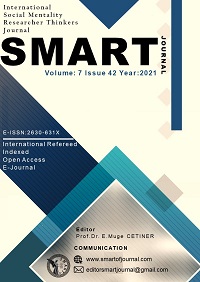Author :
Abstract
Günümüzde örgütler son derece rekabetçi bir ortam içinde teknolojik değişimlere ayak uydurmaya çalışmaktadırlar. Bu rekabet sürecinde en önemli sermayeleri ise insan kaynaklarıdır. Bir işletmede rekabet üstünlüğü için en önemli kaynağın iş gücü olduğu görüşü az ya da çok her dönem için geçerlidir. Ancak küreselleşme koşullarında artan rekabetle birlikte fark yaratan esas kaynakların başında iş gücünün geldiği günümüzde artan herkes tarafından kabul edilen bir olgudur. Örgütler tarafından insan kaynağı ne kadar verimli ve etkili kullanılırsa, hedeflere ulaşma noktasında başarılı olma olasılığı o oranda artacaktır. Günümüzde artık örgütsel bağlılığın örgütler için son derece önemli olduğu bilinmektedir, çünkü örgüte bağlı ve tatmini yüksek çalışanların üretkenliği fazla olacaktır. Bunun yanında İş tatmini de insan kaynakları yönetimi ve örgütsel davranış alanında en çok araştırılan olgulardan biridir. Bu nedenle, iş tatmini ve örgütsel bağlılık, yönetim literatüründe yaygın olarak incelenen alanlardan biridir.
Keywords
Abstract
Today, organizations are trying to keep up with technological changes in a highly competitive environment. Their most important capital in this competitive process is human resources. The view that the most important resource for competitive advantage in an enterprise is labor force is more or less valid for all periods. However, it is a phenomenon that is increasingly accepted by everybody in today's world, where the labor force is one of the main resources that make a difference with the increasing competition in globalization conditions. The more efficient and effective the human resources are used by the organizations, the more likely they are to be successful in reaching their goals. Today, it is known that organizational commitment is extremely important for organizations, because the productivity of employees who are committed to the organization and with high satisfaction will be high. In addition, job satisfaction is one of the most researched phenomena in the field of human resource management and organizational behavior. For this reason, job satisfaction and organizational commitment is one of the areas widely studied in management literature.
Keywords
- Aziri, B. (2011). “Job satisfaction: A literature review”, Management Research and Practice, 3(4): 77-86.
- Aziri, B. (2011). “Job satisfaction: A literature review”, Management Research and Practice, 3(4): 77-86.
- Bodla, M. A., & Danish, R. Q. (2009). “Politics and workplace: an empirical examination of the relationshipbetween perceived organizational politics and work performance”, South Asian Journal of Management, 16(1): 44.
- Buitendach J.H. & De Witte, H. (2005). “Job insecurity, extrinsic and intrinsic job satisfaction and affectiveorganisational commitment of maintenance workers in a parastatal”, South African Journal of Business Management, 36(2): 27-37.
- Chughtai, A. & Zafar, S. (2006). “Antecedents and Consequences of Organizational Commitment among Pakistani University Teachers”, Applied H.R.M. Research, 11 (1): 39-64.
- Glisson, C. and Durick, M. (1988). “Predictors of job satisfaction and organizational commitment in human service organizations”, Administrative Science Quarterly, 33(1): 61-81.
- Jaros, S. J. (1997). “An assessment of Meyer and Allen’s (1991) therecomponent model of organizational commitment and turnover intention”, Journal of Vocational Behavior 51: 319- 337.
- Kanaan, R.; Masa’deh, R. & Gharaibeh, A. (2013). “The Impact of Knowledge Sharing Enablers onKnowledge Sharing Capability: An Empirical Study on Jordanian Telecommunication Firms”, European Scientific Journal, 9 (22): 237-258.
- Lambert, E. G.; Hogan, N. L. & Keena, L. D. (2015). “The Impact of Job Attitudes on Private CorrectionalStaff's Continuance and Affective Organizational Commitment”, Journal of Applied Security Research, 10 (1): 1-22.
- Locke, E. A. (1976). “The nature and causes of job satisfaction,” in Handbook of Industrial and Organizational Psychology”, ed M. D. Dunnette (Chicago, IL: Rand McNally), 1297–1349.
- Meyer J. P. & Allen, N. J. (1991). “A Three-Component Conceptualization of Organizational Commitment”, Human Resource Management Review, 1: 61-89.
- Meyer, J. P. & Allen, N. J. (1997). Commitment in the Workplace: Theory, Research, and Application, Thousand Oaks, CA: Sage.
- Meyer, J. P. & Herscovitch, L. (2001). "Commitment in the workplace, toward a general model", Human Resource Management Review, 11: 299-326.
- Miao, R. (2011). Perceived Organizational Support, Job Satisfaction, Task Performance and Organizational Citizenship Behavior in China, University of Science and Technology Liaoning Anshan, China.
- Mowday R. T.; Porter L.W & Streets R.M. (1982). “Employee-organization linkages: The psychology of commitment, absenteeism and turnover”, Academic Press, 65-85.
- Mulinge, M. M. (2000). “Toward an explanation of cross-sector differences in job satisfaction andorganizational attachment among agricultural technicians in Kenya”, African Sociological Review/Revue Africaine de Sociologie, 4(1): 54-73.
- Obeidat, B.; Masa’deh, R. & Abdallah, A. (2014). “The Relationships among Human Resource ManagementPractices, Organizational Commitment, and Knowledge Management Processes: A Structural Equation Modeling Approach”, International Journal of Business and Management, 9 (3): 9-26.
- Oshagbemi T. (1997). “Job satisfaction and dissatisfaction in higher education”, Education & Training, 39 (9): 354-359.
- Oshagbemi, T. (2000). “Correlates of pay satisfaction in higher education”, The International Journal of Educational Management, Vol.14: 95-107.
- Porter, L.; Steers, R.; Mowday, R. & Boulian, P. (1974). “Organizational Commitment, Job Satisfaction, and Turnover among Psychiatric Technicians”, Journal of Applied Psychology, 59 (5): 603-609.
- Rego, A.; Leite, R.; Carvalho, T.; Freire, C. & Vieira, A. (2004). “Organizational Commitment: Toward aDifferent Understanding of the Ways People Feel Attached to their Organizations”, Management Research: Journal of the Iberoamerican Academy of Management, 2 (3): 201-218.
- Schneider, B. & Snyder, R. A. (1975). “Some relationships between job satisfaction and organization climate”, J. Appl. Psychol, 60:318.
- Shagholi, R.; Zabihi, M. R.; Atefi, M. & Moayedi, F. (2011). “The Consequences of Organizational Commitment in Education”, Procedia Social and Behavioral Sciences, 15: 246-250.
- Shiva, M. & Suar, D. (2010). “Ledership, LMX, Commitment, and NGO Effectiveness: TransformationalLeadership, Leader-Member Exchange, Organizational Commitment, Organizational Effectiveness, andProgramme Outcomes in Non-Governmental Organizations”, International Journal of Rural Management, 6 (1): 117-150
- Stan, M. M. (2013). “Predictors of the Organizational Commitment in the Romanian Academic Environment”, Procedia-Social and Behavioral Sciences, 78: 672-676.
- Wong, Y.T.; Ngo, H.Y. & Wong, C.S. (2002). “Affective Organizational Commitment of Workers in Chinese Joint Ventures”, Journal of Managerial Psychology, 17 (7): 580-598





